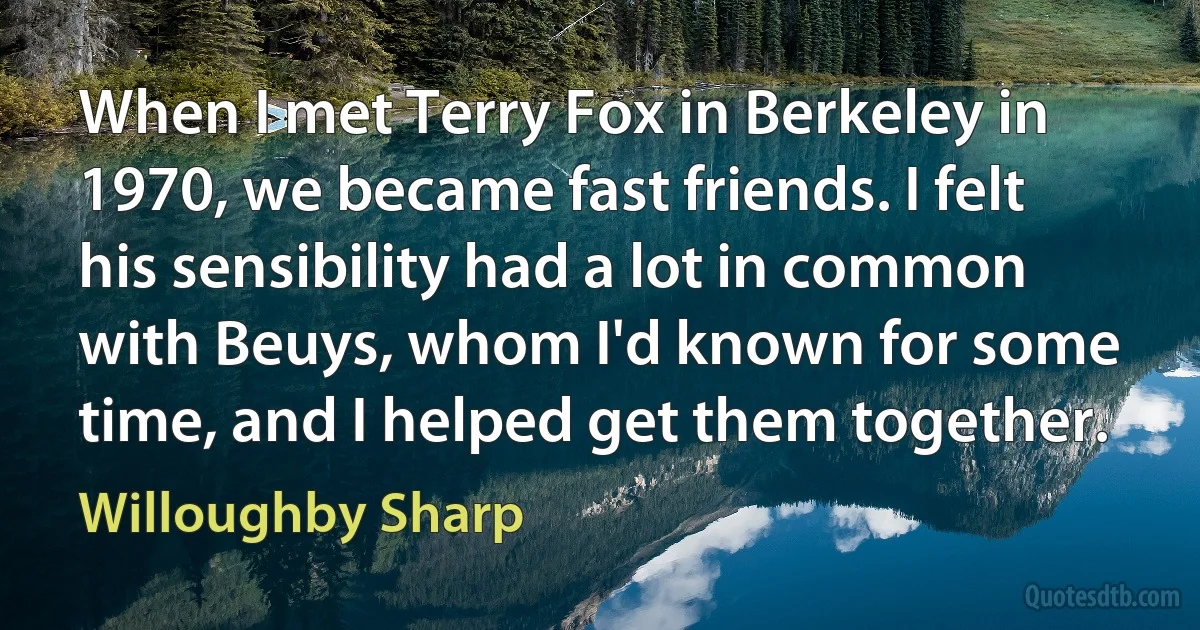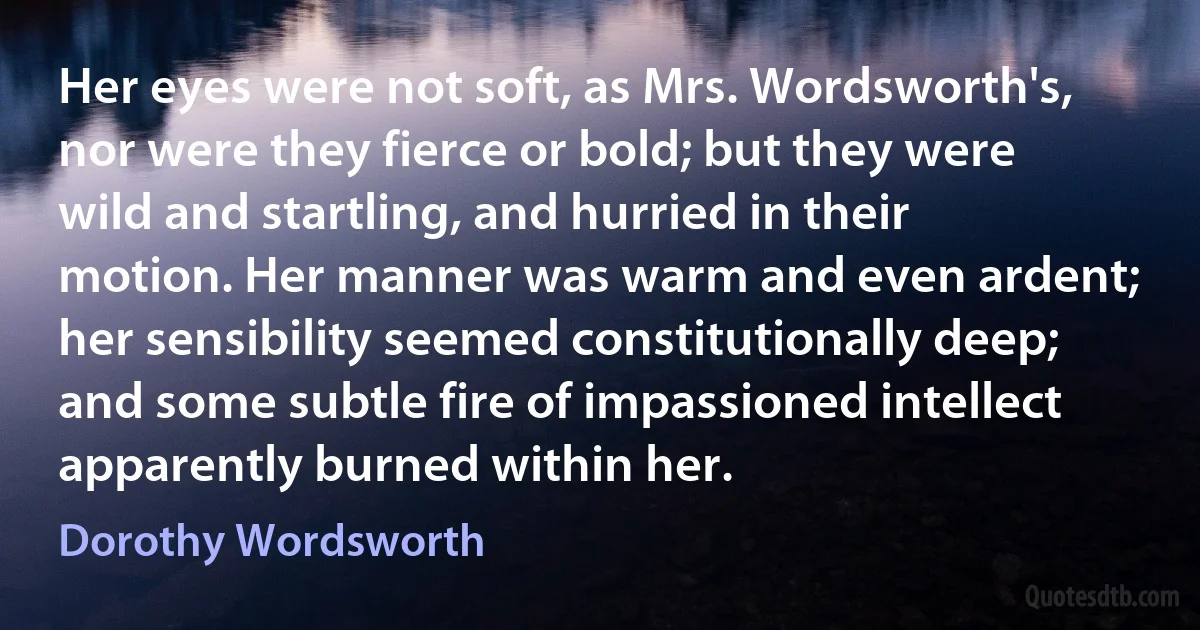Sensibility Quotes - page 10
The artist, however faithful to his personal vision of reality, becomes the last champion of the individual mind and sensibility against an intrusive society and an officious state. The great artist is thus a solitary figure. He has, as Frost said, a lover's quarrel with the world. In pursuing his perceptions of reality, he must often sail against the currents of his time. This is not a popular role. If Robert Frost was much honored in his lifetime, it was because a good many preferred to ignore his darker truths. Yet in retrospect, we see how the artist's fidelity has strengthened the fiber of our national life. If sometimes our great artist have been the most critical of our society, it is because their sensitivity and their concern for justice, which must motivate any true artist, makes him aware that our Nation falls short of its highest potential. I see little of more importance to the future of our country and our civilization than full recognition of the place of the artist.

John F. Kennedy
It is significant, as William Vaughan remarks in his introduction to Borsch-Supan's catalogue, that churches never appear in Friedrich's work except in the distance, as unreal visions, or as ruins. The visible Church is dead, only the invisible Church, in the heart or revealed through Nature, is alive. This is part of Friedrich's Pietist heritage, a personal religion that refuses all outward forms, all doctrine. To put a landscape on an altar is an aggressive act, as destructive of the old forms as it is creative of a new sensibility.

Caspar David Friedrich
We now know too much about matter to be materialists. The very essence of the physical order of things is that it creates nothing new. Change is never more than a redistribution of that which never changes. But sensibility belongs to the world of consciousness, not to the world of matter.

Arthur Balfour
A landscape of uncommon merit has been painted lately by Mr. Gainsborough. It is a picturesque scene, and although limited in extent of country is beautifully romantic. It contains a rustic history that cannot fail to impart delight to every beholder. Three peasant children are introduced; one of them, a young girl, has an infant brother in her arms; the other, a little boy of about six years, appears to have been engaged in the task of collecting the broken branches of trees for fire-wood; he is resting on a bank in conversation with his sister. A pastoral innocence and native sensibility give inexpressible beauty to these charming little objects. They cannot be viewed without the sensations of tenderness and pleasure, and an interest for their humble fate.

Thomas Gainsborough
Galileo's program offers us a dead world: Out go sight, sound, taste, touch, and smell, and along with them have since gone esthetic and ethical sensibility, values, quality, soul, consciousness, spirit. Experience as such is cast out of the realm of scientific discourse. Hardly anything has changed our world more during the past four hundred years than Galileo's audacious program. We had to destroy the world in theory before we could destroy it in practice.

Galileo Galilei
I think my work still has a distinctive voice that is uniquely mine-and that voice is one of a person speaking Spanish in English. By that I mean that I write with the syntax and sensibility of Spanish, even when there isn't a syllable of Spanish present. It's engrained in the way I look at the world, and the way I construct sentences and stories. I was not aware of this when I wrote House, but I'm conscious of it now. What remains the same? Well, I am still as astonished by the world and as intuitive/foolish as ever, but I am aware that this is a good thing, and not ashamed of it as I was when I was young. The difference now is that I know myself. I think my writing is wiser, and, I hope, more complex.

Sandra Cisneros
Usually, my witticisms are composed on the spot. They're simply intrinsic; an inseparable, integral, organic part of my writing process - doubtlessly because humor is an inseparable, integral part of my philosophical worldview. The comic sensibility is vastly, almost tragically, underrated by Western intellectuals. Humor can be a doorway into the deepest reality, and wit and playfulness are a desperately serious transcendence of evil. My comic sense, although deliberately Americanized, is, in its intent, much closer related to the crazy wisdom of Zen monks and the goofy genius of Taoist masters than it is to, say, the satirical gibes on Saturday Night Live. It has both a literary and a metaphysical function.

Tom Robbins
What I am searching for... is some formula that would combine individual initiative with universal values, and that combination would give us a truly organic form. Form, which we discover in nature by analysis, is obstinately mathematical in its manifestations-which is to say that creation in art requires thought and deliberation. But this is not to say that form can be reduced to a formula. In every work of art it must be re-created, but that too is true of every work of nature. Art differs from nature not in its organic form, but in its human origins: in the fact that it is not God or a machine that makes a work of art, but an individual with his instincts and intuitions, with his sensibility and his mind, searching relentlessly for the perfection that is neither in mind nor in nature, but in the unknown. I do not mean this in an other-worldly sense, only that the form of the flower is unknown to the seed.

Herbert Read
A genuinely democratic society requires a secular ethos: one that does not equate morality with religion, stigmatize atheists, defer to religious interests and aims over others or make religious belief an informal qualification for public office. Of course, secularism in the latter sense is not mandated by the First Amendment. It's a matter of sensibility, not law.

Ellen Willis
The poet is, etymologically, the maker. Like all makers, he requires a stock of raw materials - in his case, experience. Now experience is not a matter of having actually swum the Hellespont, or danced with the dervishes, or slept in a doss-house. It is a matter of sensibility and intuition, of seeing and hearing the significant things, of paying attention at the right moments, of understanding and co-ordinating. Experience is not what happens to a man; it is what a man does with what happens to him. It is a gift for dealing with the accidents of existence, not the accidents themselves. By a happy dispensation of nature, the poet generally possesses the gift of experience in conjunction with that of expression. What he says so well is therefore intrinsically of value.

Aldous Huxley


